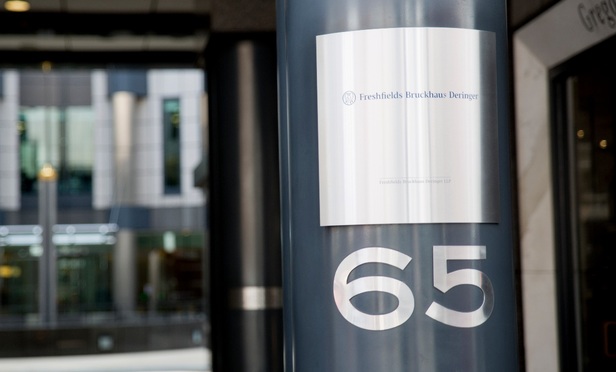
"They always intended to maintain lockstep, but it has become impossible," says one former Freshfields Bruckhaus Deringer partner after the firm voted through a radical shake-up of its lockstep last week.
A current partner concedes that the move – which extends Freshfields' lockstep ladder to a 60-point peak for star performers that equates to around £3m, and adds three gates lower down to control progress – was inevitable.
"You can see the way the world is moving; it is not exactly as if this is unchartered territory," he says, referencing similar moves to flex lockstep by magic circle rivals, as well as the more merit-based pay systems in place at many US firms as drivers.
The changes, which come into effect from 1 May next year, mean Freshfields has leapfrogged rivals such as Linklaters in the extent to which it has torn up its traditional lockstep model.
And this is despite the fact the remaining members of its current management team ran on a conservative platform when they were elected in 2015, saying they would not bring in radical changes.
You only really change things that you care passionately about when you feel vulnerable
Senior partner Ed Braham and then co-managing partners Stephan Eilers and Chris Pugh beat head of London corporate Simon Marchant and litigation partner Caroline Stroud who had a more hawkish stance on lockstep reform.
A former partner says: "The Braham-Pugh ticket was: 'steady as she goes; we are not going to change anything.'"
However, in the wake of subsequent high-profile partner exits, including corporate partner Mark Rawlinson to Morgan Stanley and M&A partner Ben Spiers to Simpson Thacher & Bartlett in London, poor financial results compared to its peers, and a halving of its four-person management team, the position changed.
Executive partner Michael Lacavora joined Latham & Watkins in New York while co-managing partner Chris Pugh stepped down from his role in July.
One magic circle partner says: "You only really change things that you care passionately about when you feel vulnerable; they have had a tough 18 months and lost a couple of stars."
One former partner says: "All their talk of increasing profitability per point [without changing lockstep] was pie in the sky."
These same partners say Freshfields' changes outstrip those of peers like Linklaters, which last year ushered in a fairly conservative set of reforms that fell short of what some in the firm were arguing for.
A partner at a rival magic circle firm says: "Freshfields would traditionally have been regarded as very purist, but have arguably moved further than the competition."
While the success of the reforms will be hard to judge in the short term, many in the market believe the 40-point (£2m) top of lockstep that will apply to the overwhelming majority of partners represents a good deal for most.
One recruiter comments: "For the majority of partners, if they went out and tried to market themselves, 99% would come back to Freshfields and be happy with what they get."
For the handful of top partners reaching the £3m elite plateau, the package will put the firm firmly within the Premier League for partner pay, even if some argue it will remain more Liverpool than Manchester City compared with the likes of a Kirkland & Ellis for example.
£3m is a big chunk of change but they still won't be able to compete with premium US firms like Simpson and Kirkland
The recruiter adds: "Who would they be? Liverpool? They still can't compete with the big guys, £3m is a big chunk of change but Freshfields still won't be able to compete with premium US firms like Simpson and Kirkland that are sitting above the likes of them and Latham."
Some argue that the changes do not address the underlying problems that lockstep firms have when trying to compete with merit-based US firms, where remuneration can be significantly higher. This is particularly likely to be a problem when it comes to younger or mid-level partners, as Freshfields is not able to accelerate their progress.
"How sustainable is lockstep nowadays when you have so many more people coming in waving big chequebooks, especially at the younger people who even in a modified lockstep model don't get to be accelerated earlier?" one ex-partner says.
Another potential issue is that during the transitional period when all partners are being assessed and their profit shares recalculated, some may be unsettled and look elsewhere.
One magic circle partner says: "The lockstep purists will argue that this could unsettle the home base, and I think there is something in that. Introducing a difference between stars and very good people in London - people who have grown up as complete equals in remuneration and status terms – is remarkably difficult.
"It isn't the case that it is a small band of brothers at the top in terms of performance - it is shades of grey, and it changes. Some people are very good for two years and then not so good the next year."
A former partner adds: "It is a big step, and one that will no doubt cause a lot of angst and heartache". Another predicts: "I am sure there will be some CVs in the market in due course."
However, one insider reckons that the firm's keen focus on performance in recent years, which has included a restructuring of its finance practice, means there is unlikely to be a mass exodus of partners.
Either way, the the firm's performance will be scrutinised closely by UK rivals searching for their own perfect remuneration formula in the face of US competition.
A partner at a magic circle firm says: "If the net effect means that Freshfields have five to ten really good years, we will all change. But if it unsettles 30 or 40 really good partners, it will look like a disaster. It's a big call."
This content has been archived. It is available through our partners, LexisNexis® and Bloomberg Law.
To view this content, please continue to their sites.
Not a Lexis Subscriber?
Subscribe Now
Not a Bloomberg Law Subscriber?
Subscribe Now
NOT FOR REPRINT
© 2025 ALM Global, LLC, All Rights Reserved. Request academic re-use from www.copyright.com. All other uses, submit a request to [email protected]. For more information visit Asset & Logo Licensing.
You Might Like
View All

Trump Administration Faces Legal Challenge Over EO Impacting Federal Workers
3 minute read
Elon Musk’s Tesla Pay Case Stokes Chatter Between Lawyers and Clients
7 minute readTrending Stories
Who Got The Work
J. Brugh Lower of Gibbons has entered an appearance for industrial equipment supplier Devco Corporation in a pending trademark infringement lawsuit. The suit, accusing the defendant of selling knock-off Graco products, was filed Dec. 18 in New Jersey District Court by Rivkin Radler on behalf of Graco Inc. and Graco Minnesota. The case, assigned to U.S. District Judge Zahid N. Quraishi, is 3:24-cv-11294, Graco Inc. et al v. Devco Corporation.
Who Got The Work
Rebecca Maller-Stein and Kent A. Yalowitz of Arnold & Porter Kaye Scholer have entered their appearances for Hanaco Venture Capital and its executives, Lior Prosor and David Frankel, in a pending securities lawsuit. The action, filed on Dec. 24 in New York Southern District Court by Zell, Aron & Co. on behalf of Goldeneye Advisors, accuses the defendants of negligently and fraudulently managing the plaintiff's $1 million investment. The case, assigned to U.S. District Judge Vernon S. Broderick, is 1:24-cv-09918, Goldeneye Advisors, LLC v. Hanaco Venture Capital, Ltd. et al.
Who Got The Work
Attorneys from A&O Shearman has stepped in as defense counsel for Toronto-Dominion Bank and other defendants in a pending securities class action. The suit, filed Dec. 11 in New York Southern District Court by Bleichmar Fonti & Auld, accuses the defendants of concealing the bank's 'pervasive' deficiencies in regards to its compliance with the Bank Secrecy Act and the quality of its anti-money laundering controls. The case, assigned to U.S. District Judge Arun Subramanian, is 1:24-cv-09445, Gonzalez v. The Toronto-Dominion Bank et al.
Who Got The Work
Crown Castle International, a Pennsylvania company providing shared communications infrastructure, has turned to Luke D. Wolf of Gordon Rees Scully Mansukhani to fend off a pending breach-of-contract lawsuit. The court action, filed Nov. 25 in Michigan Eastern District Court by Hooper Hathaway PC on behalf of The Town Residences LLC, accuses Crown Castle of failing to transfer approximately $30,000 in utility payments from T-Mobile in breach of a roof-top lease and assignment agreement. The case, assigned to U.S. District Judge Susan K. Declercq, is 2:24-cv-13131, The Town Residences LLC v. T-Mobile US, Inc. et al.
Who Got The Work
Wilfred P. Coronato and Daniel M. Schwartz of McCarter & English have stepped in as defense counsel to Electrolux Home Products Inc. in a pending product liability lawsuit. The court action, filed Nov. 26 in New York Eastern District Court by Poulos Lopiccolo PC and Nagel Rice LLP on behalf of David Stern, alleges that the defendant's refrigerators’ drawers and shelving repeatedly break and fall apart within months after purchase. The case, assigned to U.S. District Judge Joan M. Azrack, is 2:24-cv-08204, Stern v. Electrolux Home Products, Inc.
Featured Firms
Law Offices of Gary Martin Hays & Associates, P.C.
(470) 294-1674
Law Offices of Mark E. Salomone
(857) 444-6468
Smith & Hassler
(713) 739-1250









